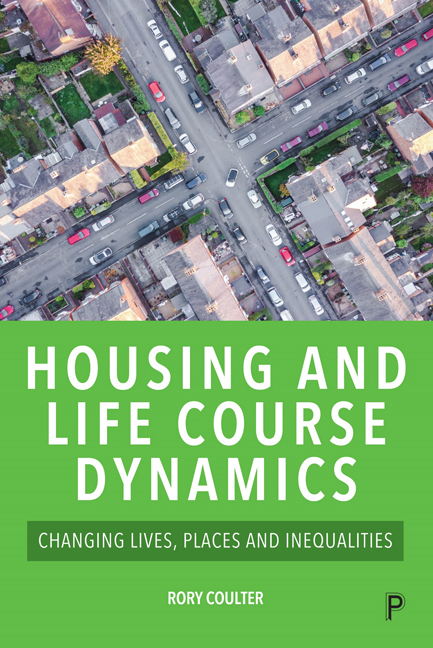Book contents
- Frontmatter
- Dedication
- Contents
- List of figures and tables
- List of abbreviations
- Notes on the author
- Acknowledgements
- Preface
- 1 Introduction
- 2 Housing: a life course perspective
- 3 Households and families
- 4 Learning and training
- 5 Employment and money
- 6 Health, well-being and care
- 7 Changing places
- 8 Understanding housing and life course dynamics
- Notes
- References
- Index
7 - Changing places
Published online by Cambridge University Press: 18 January 2024
- Frontmatter
- Dedication
- Contents
- List of figures and tables
- List of abbreviations
- Notes on the author
- Acknowledgements
- Preface
- 1 Introduction
- 2 Housing: a life course perspective
- 3 Households and families
- 4 Learning and training
- 5 Employment and money
- 6 Health, well-being and care
- 7 Changing places
- 8 Understanding housing and life course dynamics
- Notes
- References
- Index
Summary
The previous chapters have examined how events and processes in the housing career interact with those in other domains of life. In keeping with most life course scholarship, these chapters have focused primarily on the dynamics of lives and the ways these are shaped by a variety of contextual forces. While this micro-level approach is clearly essential for understanding residential behaviour, one limitation is that places are often conceptualised as external containers within which life course processes unfold. Yet geographical research has long shown that the ways people selectively stay in or leave places over the life course actively alters the population composition and social fabric of neighbourhoods and localities. There is thus a two-way relationship between the dynamics of life courses and places: when places change, lives change and when lives change, places change.This chapter begins by sketching how life course perspectives can be applied to understand local processes of population change. It shows how patterns of residential behaviour – specifically the ways people make decisions to stay in, leave, enter or avoid particular residential locations – mediate how changes in life courses have aggregate impacts on the demographic and socio-economic composition of neighbourhoods and localities. The chapter's remaining sections then unpack how the sorts of life course dynamics explored in previous chapters reshape local populations by altering (1) residential preferences and aspirations, (2) resources and restrictions, (3) life events and transitions, and (4) opportunities and constraints. Examples of each mechanism are explored in turn although in reality all four will always matter for local processes of population change.Understanding local population dynamicsDefining what neighbourhoods are is a vital but surprisingly difficult first step for any study of local population change. For Galster (2012, p 85), neighbourhoods are ‘the bundle of spatially based attributes associated with clusters of residences, sometimes in conjunction with other land uses’. This definition highlights that neighbourhoods are compact residential spaces which often have distinctive physical attributes (types of buildings, infrastructure, environmental attributes and so forth) and social characteristics that derive from their residents (for instance their demographic and socioeconomic mix). The fact that neighbourhood characteristics derive in part from the people living there implies that any changes within residents’ lives or in who lives in a particular place will alter the area's aggregate characteristics.
- Type
- Chapter
- Information
- Housing and Life Course DynamicsChanging Lives, Places and Inequalities, pp. 144 - 167Publisher: Bristol University PressPrint publication year: 2023



